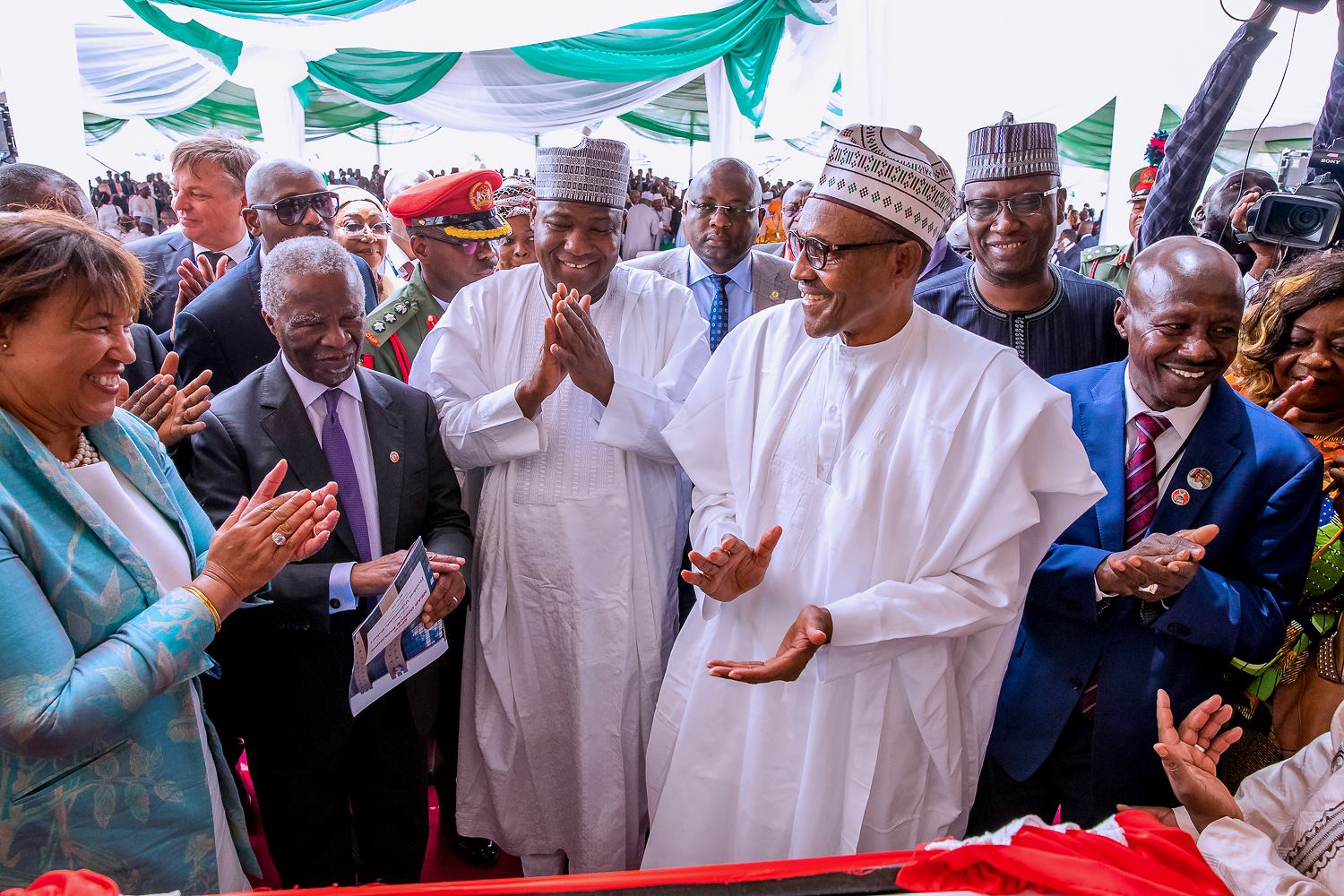BUHARI’S SECOND TERM: Time To Pull Together
By Bowie Attamah
Following President Muhammadu Buhari’s electoral victory in 2015 which saw to the ousting of the incumbent Goodluck Jonathan, Nigeria has gone through an event-filled four years that has been a mixed bag of the good, the not so good, and the bad.
It has therefore been a veritable potpourri of achievements, acclaim by supporters of the government, and criticism by its traducers, and even sometimes, deliberate misinformation by that part of the virulent opposition that wants, more than anything else, to bring the government to its knees.
To defeat a sitting president is surely not one of the easiest things to accomplish in any clime, let alone in Africa so when Muhammadu Buhari accomplished this feat in 2015, it was perfectly understandable how the attention of, not only all Nigerians, but the whole world was riveted on Nigeria.
Everyone waited, with bated breath, to see how Buhari who had been a military Head of State in the 1980s, and a state governor before that, would cope as a civilian president.
Expectations were high in all quarters. There was an equal measure of optimism, skepticism, and pessimism.
The combined effect of this scenario brought intense and sustained pressure to bear on President Buhari and his fledgling administration. Some waited with great expectation and optimism for what they hoped would be an upgrade on the immediate past government of Goodluck Jonathan.
Some others were merely genuinely curious to see how the man coped in the Nigerian political land mine, while there were yet others who believed it was just a matter of time before Buhari’s government was overwhelmed by the sheer force and turbulence of the waters it had to negotiate.
What has happened is perhaps a combination of all three – in varying degrees. But it has to be quickly said that all in all, it has tilted towards a positive scorecard, as articulated by the Special Presidential Adviser on Media and Publicity, Femi Adesina.
A look at the following(abbreviated) scorecard would underline the reason for this belief;
– the naira has considerably stabilized against the dollar and this in turn has boosted investment in the country since about the second quarter of 2017
– after coming out of our worst recession in years that saw a five-month unbroken negative growth index in 2017, the prognosis has remained encouragingly positive since
– bumper food harvests have occurred year after year, particularly in the area of rice production, as a result of which many states of the country have seen massive increase in their output – states like Ebonyi, Ogun, Kano and Kebbi, among several others
– aside from the recent blip in the power situation in and around the Federal Capital Territory(FCT), this sector has witnessed a great improvement nationwide
– Nigeria has risen rapidly on the World Bank’s Ease of Doing Business Index and now finds herself among the top ten reformers in the world
– as a result of improved investments Nigeria’s Stock Exchange has now been rated one of the best performing in the world
– the story of Nigeria’s foreign exchange reserves has been more positive than negative in recent years
– as at the last count in March, 2019, Nigeria had recovered more than 9.12 billion naira through the Whistle Blowing Policy it recently introduced
– under the Federal Government’s Social Investment Programme, millions of primary school children in thousands of schools nationwide are fed daily
– the Nigeria Customs Service has seen an astronomical increase in the amount of revenue it remits to the federal coffers due to more conscientious operations; and same can be said of the Joint Admissions and Matriculation Board(JAMB) which has remitted more than 7.8 billion naira, as opposed to the 51 million naira delivered by the previous Board for the period, 2010 to 2016,
– numerous fertilizer blending plants have been revived under the Presidential Fertilizer Initiative(PFI), and
– infrastructural resuscitation has received a tremendous impact throughout the country, under the Buhari-led Federal Government since he mounted the saddle in 2015.
It is not intended to suggest here that it has been a roller coaster three years plus of seamless success, but as earlier stated, the positives have heavily outweighed the negatives.
Now as President Buhari embarks on his second, and terminal four-year tenure, the dynamics of leadership and followership should be considerably altered.
Hitherto politics – which sometimes people refer to as politrics – had pervaded everything we did. All government policies were given political colourations and always viewed from the prism of political divides. Those in favour and those against.
Quite obviously in such a polarized atmosphere, real progressive nation-building was pretty difficult, if not downright impossible to achieve. Centrifugal forces ensured that people were pulling away from the centre in different directions, and certainly this was not in anybody’s interest who professed to love Nigeria, and desired her progress.
This is why President Buhari must now adopt a different approach to governance.
Having achieved such commendable success during his first tenure, it is time to consolidate. It is time to invite Nigerians to put their hands to the oar and pull in one direction. It is time to join the government in the task of moving this nation to the next level.
Some machineries of the federal government which had served it well during that first tenure clearly need to be tweaked to fall in line with this need to carry Nigerians along on the journey ahead.
The best place to start this repositioning of the government’s new thrust would be the information dissemination apparatus – the Federal Ministry of Information and Culture, where Alhaji Lai Mohammed held sway as minister.
Mohammed has actually served this administration well since his appointment to that position on November 11, 2015, about six months after the swearing in of President Buhari.
The erudite and articulate minister has marshalled the nation’s information paraphernalia quite effectively since, with the president’s personal aides, his Special Adviser on Media and Publicity, Femi Adesina, and his Senior Special Assistant on Media, Garba Shehu putting in a great shift since their appointments as well.
However, the position of Information Minister is of such great importance in delivering the message of government and acting as a catalyst to engender the requisite critical mass followership that the government needs to run an all-inclusive administration such that the people’s perception of the occupier of that position is not simply glossed over.
This is where it becomes essential for the president to effect a bold change by bringing in a new face in that most vital ministry that in real terms, is the face of his administration.
In very simple language, Nigerians no longer trust Lai Mohammed.
A groundswell of this distrust has been growing over the years and has got to a point where the learned gentleman is now more a liability than an asset to President Buhari, and the president can certainly do without that drawback, moving forward in his new term of office.
If there was any doubt of the man’s non-acceptance by Nigerians, it was demonstrated in shocking clarity at the most unexpected forum last August.
On Tuesday 28th August last year 2018, at the 58th Annual General Conference(AGC) of the Nigerian Bar Association(NBA), the minister was scheduled to address the august gathering but as soon as he got up to deliver his address there was a deep rumbling murmur of boos from the thousands of lawyers there on attendance at the International Conference Centre in Abuja.
Nothing could be more eloquent and definitive about the man’s loss of good standing with the Nigerian public than this rejection by his professional colleagues, he himself being a lawyer.
What has made his continued stay as Minister of Information and Culture untenable is that he is the official spokesman of the government. When the majority of Nigerians no longer seem to believe or trust him, what does that say for his ability to deliver the policies of government to the people such that they would join hands to implement them?
Incidentally, his principal, President Muhammadu Buhari while declaring the 2018 AGC open two days earlier, had described the theme of that year’s Conference which was, Transition, Transformation and Sustainable Institution as one which was apt, ‘in the light of our contemporary domestic and global challenges’.
He said that he also considered it significant in view of the fact that it demonstrated the willingness of the NBA to address, not only issues relating to the practice of law, but more importantly, to finding solutions to the wider societal problems.
In this context, it is a sad commentary on the state of affairs in this country that the same members of the Nigerian Bar whom the President saw as partners in progress, would turn around to deny one of their own the right of audience so publicly and so ignominiously.
The way forward, in my opinion, is for Mr President to appoint a new Information and Culture Minister who would begin by fostering a bond of trust and acceptability with the citizens.
A new government spokesman that would signify a break with the past, and reassure Nigerians that here at last is someone you can trust. Someone that already has national recognition and acceptability.
There several Nigerians who fall under this category.
A name that readily comes to mind is Senator Ayogu Eze, a two-time Senator of the Federal Republic of Nigeria who had, at different times, been Chairman, Senate Committee on Works, and Senate committee on Information and Media where, I dare say, he did a damn good job.
He was also variously a member of several Senate Committees, among them, Marine Transport, Appropriation, National Planning, Police Affairs, Federal Character and Inter-Governmental Affairs.
He was also at different times on such other committees as Communications, Senate Services, Public Accounts and Information.
Senator Ayogu(as he is generally referred to), it perhaps needs to be pointed out, is a dyed-in-the-wool media person. He had paid his dues as reportorial and editorial staff in various newspapers and magazines before his highly successful sojourn into politics.
He also served as Commissioner for Information and Culture in Enugu, his home state.
Also towering in the media family is John Momoh, the owner and chief executive Officer of Channels Television.
From his days as the face of the Nigeria Television Authority, to his floating and running a multiple-award winning television station of his own, Momoh has come across as a gentleman par excellence, a man that would not need to labour too hard to earn the trust of Nigerians.
Danladi Bako is another person who enjoys wide recognition.
He also made his name at NTA in the ‘80s and the ‘90s and has equally distinguished himself in every area of life he has been called upon to serve, over the years.
I do not know what his political leaning is – because it should not matter.
What the nation needs is a man who would be able to strike a rapport with the Nigerian people and therefore be able to mobilize them for the task ahead.
What the nation needs is an accomplished professional.
In conclusion, President Buhari needs to start this second term on a clean slate as far as his relations with Nigerians go.
For that to happen, he needs a new Information Minister, one without the baggage of the immediate past occupier of that position.
Attamah, a Lawyer, Social Commentator and Media Consultant, is based in Abuja.

